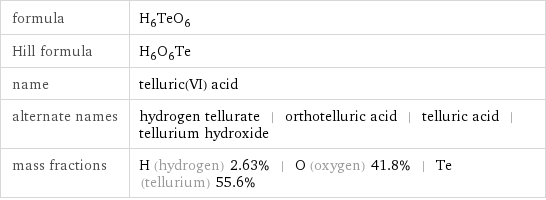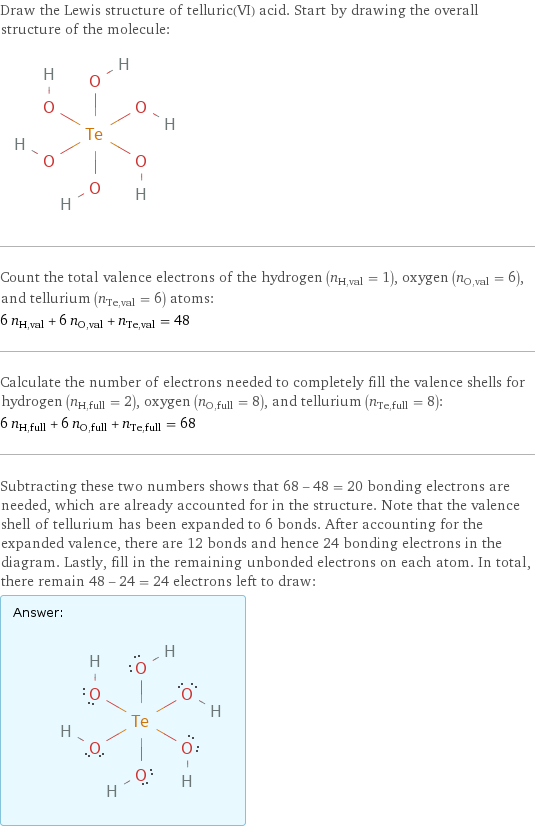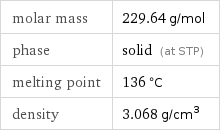Input interpretation

telluric(VI) acid
Chemical names and formulas

formula | H_6TeO_6 Hill formula | H_6O_6Te name | telluric(VI) acid alternate names | hydrogen tellurate | orthotelluric acid | telluric acid | tellurium hydroxide mass fractions | H (hydrogen) 2.63% | O (oxygen) 41.8% | Te (tellurium) 55.6%
Lewis structure

Draw the Lewis structure of telluric(VI) acid. Start by drawing the overall structure of the molecule: Count the total valence electrons of the hydrogen (n_H, val = 1), oxygen (n_O, val = 6), and tellurium (n_Te, val = 6) atoms: 6 n_H, val + 6 n_O, val + n_Te, val = 48 Calculate the number of electrons needed to completely fill the valence shells for hydrogen (n_H, full = 2), oxygen (n_O, full = 8), and tellurium (n_Te, full = 8): 6 n_H, full + 6 n_O, full + n_Te, full = 68 Subtracting these two numbers shows that 68 - 48 = 20 bonding electrons are needed, which are already accounted for in the structure. Note that the valence shell of tellurium has been expanded to 6 bonds. After accounting for the expanded valence, there are 12 bonds and hence 24 bonding electrons in the diagram. Lastly, fill in the remaining unbonded electrons on each atom. In total, there remain 48 - 24 = 24 electrons left to draw: Answer: | |
Basic properties

molar mass | 229.64 g/mol phase | solid (at STP) melting point | 136 °C density | 3.068 g/cm^3
Units

Solid properties (at STP)

density | 3.068 g/cm^3
Units

Chemical identifiers
(O)(O)(O)O InChI identifier | InChI=1/H6O6Te/c1-7(2, 3, 4, 5)6/h1-6H RTECS number | WY2350000 MDL number | MFCD00011609](../image_source/45ac3142d5a1f33c933c66ef3a31a96e.png)
CAS number | 7803-68-1 PubChem CID number | 62686 PubChem SID number | 24858673 SMILES identifier | O[Te](O)(O)(O)(O)O InChI identifier | InChI=1/H6O6Te/c1-7(2, 3, 4, 5)6/h1-6H RTECS number | WY2350000 MDL number | MFCD00011609
Toxicity properties

RTECS classes | other
Ion equivalents

(TeO_6)^(6-) (orthotellurate anion) | 1 H^+ (hydrogen cation) | 6